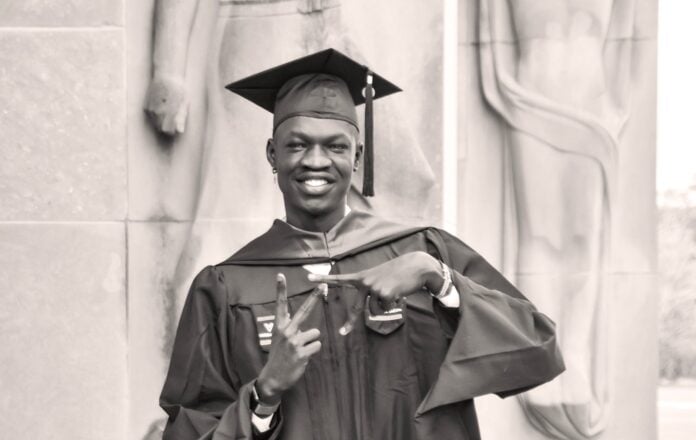When Dudi Miabok received his Master of Science in Business Administration from the Pamplin College of Business this spring, it marked the latest step in a journey shaped by perseverance, purpose, and a deep commitment to using education in service to others.
That sense of purpose — central to Virginia Tech’s motto, Ut Prosim (That I May Serve) — has defined Miabok’s path from the start.
He spent his early years in Kakuma Refugee Camp, a sprawling settlement in northwestern Kenya that’s home to more than 300,000 displaced people. He arrived there as a child after fleeing civil war in South Sudan and being separated from his parents. Life in the camp was defined by uncertainty and scarcity — food rations were often reduced, employment was restricted, classrooms were overcrowded. Yet, amid those challenges, Miabok found direction through learning.
“Education became my only way forward,” he said. “It was the one thing I could control.”
After earning his undergraduate degree on a full scholarship to Harvard, Miabok came to Virginia Tech to pursue a master’s degree — and to build on his commitment to service through education. He found in Virginia Tech a community that shared that purpose: expanding access and opportunity and putting knowledge to work for global good.
During his time in Blacksburg, he worked as a graduate assistant in Outreach and International Affairs and helped lead efforts to grow Elimisha Kakuma, a college preparatory program for high-achieving high school graduates in Kakuma Refugee Camp.
He co-founded the program in 2021 with Diing Manyang, Mary Maker, and Deirdre Hand, a two-time Hokie who now serves as the community engagement specialist for the Center for Refugee, Migrant, and Displacement Studies. Since then, Elimisha Kakuma has helped more than 40 students gain admission to universities around the world — including Virginia Tech — and has secured over $8 million in scholarships.
“One of the most powerful moments for me is when we sit down at a computer with a student to check their college application portal,” Miabok said. “Watching their face light up as they read their acceptance to a competitive university, it melts my heart every time. Knowing how hard they’ve worked and seeing their potential finally recognized is deeply fulfilling.”
Brett Shadle — professor of history and, along with Katrina Powell, part of the center’s leadership — said the program’s success lies not only in the opportunities it provides but in how it’s led.
“It’s critical that Elimisha Kakuma is refugee-founded and refugee-led,” he said. “So often, programs are created by people who may be well-meaning but lack the lived experience to truly understand the needs and challenges students face in the camp. That Dudi, Mary, and Diing decided not to turn their backs on others in Kakuma is incredibly inspiring.”
Shadle, who has researched refugee experiences in East Africa for more than a decade, has been an integral part of Virginia Tech’s broader commitment to supporting displaced learners. Through the Center for Refugee, Migrant, and Displacement Studies, he and his colleagues collaborate with community partners, refugee scholars, and international organizations to expand access to education and amplify refugee voices.
One guiding principle: Refugees aren’t just the subjects of research — they’re collaborators and authors.
A chapter titled “The Refugee Label” — written by Elimisha Kakuma students and co-edited by center faculty — will be published in a forthcoming book from Virginia Tech Publishing. A separate report, “Barriers to Education in Kakuma Refugee Camp,” jointly authored by Elimisha Kakuma and Virginia Tech students in a 2024 undergraduate research class, highlights systemic obstacles to learning in the camp. And later this summer, a second collaborative report on access to higher education will be released.
“As someone recently said in a webinar, every day should be World Refugee Day,” Shadle said. “Refugees are just like the rest of us — not looking for a handout, just the opportunity to show what they can do.”
That perspective is powerfully echoed by Ajier Ajuong, an Elimisha Kakuma student at Virginia Tech and contributor to “The Refugee Label” chapter: “Although we have to go an extra mile to achieve what others get freely, like access to higher education, that is what sets us apart and makes us proud of ourselves,” wrote Ajuong, who’s majoring in management consulting and analytics. “It doesn’t mean a refugee is an alien who doesn’t breathe the same air as the rest of the world.”
That idea — that education can be both a personal lifeline and a global connector — resonates across Virginia Tech.
Guru Ghosh, vice president for outreach and international affairs, said Miabok’s story illustrates the power of international education — and the success that Virginia Tech has had in supporting it.
“Meritorious students from other lands bring extraordinary knowledge, perspective, and life experiences to Virginia Tech,” Ghosh said. “When we welcome students like Dudi, we don’t just support their aspirations — we enrich our university community, classrooms, and student body and help drive the message that the United States remains a meritocracy where meaningful, community-focused change can have a transformational impact around the world.”
Shadle added that members of the Virginia Tech community can make a difference by supporting programs like Elimisha Kakuma, volunteering their time, and advocating for greater access to education.
“But it starts with seeing refugees as individuals — people with talent, drive, and the right to pursue their aspirations. That recognition alone can be transformative,” he said.
Miabok agreed, adding that dialogue is often the most powerful first step.
“If someone truly wants to understand refugees, I wouldn’t recommend starting with books or media coverage,” he said. “I would encourage them to talk to refugees, get to know them as people. Too often, refugees are reduced to statistics or used to reinforce stereotypes in the media. But that’s not who they are.”
By Rich Mathieson


